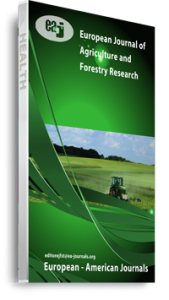The study examined climate change’s effect on cocoa production in the central agricultural zone of Cross River State, Nigeria. It specifically investigated the socioeconomic characteristics of cocoa farmers and the effect of climate variables on cocoa production in the study area. Both primary and secondary data were used for the study. Primary data were collected from 240 respondents and analyzed using descriptive statistics and the Likert scale techniques, Regression and correlation analysis were used to analyse the secondary data collected. The results of the descriptive statistics revealed that cocoa production was carried out by both men and women with men taking the production lead at 65.8% as compared to 34.2% of the women. On age distribution, the study revealed people within the age bracket of 18-50 years majorly cultivate cocoa in the area. The educational level revealed that the farmers had some form of formal education with good farming experience of between 11-20 years in cocoa production. The farmers had family sizes ranging largely between 6-15 persons in a household. The result also showed that 40% of the respondents inherited their farm holdings while 27.5%, 21.7%, and 10.8% of the respondents hired, purchased and rented their farm holdings respectively. The results of the multiple regression analysis revealed that about 78% of the climate variables influenced cocoa output in the area. It indicated that maximum temperature (Χ1), relative humidity (Χ4), wind (Χ6), and evaporation (Χ7) had an inverse relationship with cocoa output, whereas minimum temperature (Χ2), rainfall (Χ3), and sunshine hours (Χ5) had a direct relationship with cocoa output in the study area. The correlation analysis revealed that maximum temperature (Χ1), relative humidity (Χ4), and wind (Χ6) are negatively correlated with cocoa output while minimum temperature (Χ2), rainfall (Χ3), sunshine hours (Χ5) and evaporation (Χ7) are positively correlated with cocoa output in the study area. The most common strategies adopted by cocoa farmers to mitigate the effect of climate variables on cocoa production were the planting of cocoa-resistant varieties and intercropping cocoa with some tree crops to foretell bad weather conditions.
Keywords: Climate Change, Cross River State, Effect, Nigeria, cocoa production

